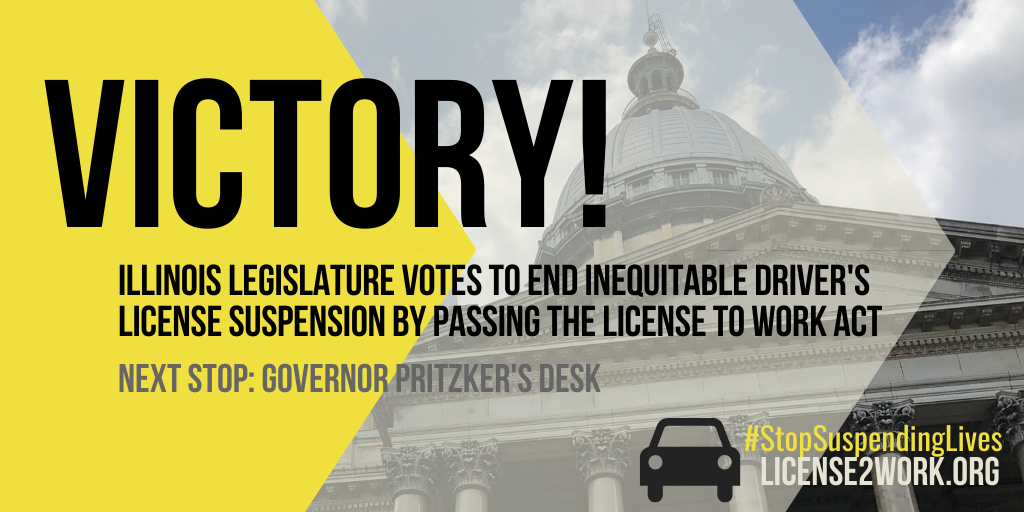License to Work Act Passes
License to Work Act:
SB 1786, the License to Work Act, passed in the Illinois legislature veto session on Tuesday, October 29. Chicago Appleseed is proud to have worked as a member of the Transit Table Coalition on this important legislation to end the practice of suspending driver’s licenses as a penalty for nonmoving violations, such as parking tickets and expired City stickers.
Governor Pritzker is expected to sign the bill, which will become effective in July 2020.
Advocacy for the bill mirrors our work on Illinois HB 4594, the Criminal and Traffic Assessment Act (CTAA), which created income-based waivers to some fines, fees, and assessments in court. The License to Work Act reforms another inequitable piece of the State’s fines and fees system: the suspension of driver’s licenses for nonmoving violations. Data shows that municipal ticketing and collections practices are frequently racially disproportionate and aggressive enforcement creates cycles of poverty. Without a valid driver’s license, people are unable to keep their jobs or find new ones.

Passing with a vote of 88-27, the Act had strong bipartisan support. Transit Table leader Eric Halvorson of the Chicago Jobs Council said:
We estimate that 400 people lose their jobs each week due to non-driving license suspensions and that suspension creates a ripple effect that upends thousands of lives. We are elated that Illinois has listened to communities and passed a bill that will bring relief to thousands.
The Act Eliminates driver’s license suspension as a penalty for most non-driving violations, including: (1) failing to pay parking, compliance, or tollway tickets, fines, or fees; (2) being judged to be a “truant minor;” (3) criminal trespass to a vehicle, and a handful of other violations. The Act also allows an individual whose license was suspended under any of these provisions to have their license reinstated. These changes focus on how the practice of suspending driver’s licenses for nonmoving violations is counterintuitive to the enforcement goals of the policy—agencies cannot collect fines and fees from people unable to work, because they have no reliable transportation to their jobs without the ability to drive. There is no public safety benefit to suspending the driver’s licenses of people without moving violations. Enforcing driving restrictions against these drivers wastes the limited resources of law enforcement and the courts without providing a meaningful return.
Disproportionate enforcement creates disparate impact; the changes to driver’s license suspension practices in Illinois due to the License to Work Act will address some of the systemic inequities. The Coalition will monitor implementation and hopes to work with the City Clerk to ensure anyone who benefits from the change gets proper notice, assistance, and access to reinstating their licenses.
Chicago Appleseed and Chicago Council of Lawyers have been involved with the Transit Table Coalition for over three years working to pass this bill. Our involvement with the Coalition stems from the work our court fines and fees working group has done. Our hope is to expand these reforms to include other sources of court debt – such as child support enforcement penalties – and break the cycle of debt and sanctions often associated with court intervention. The Collaboration for Justice is represented in the Coalition by Chicago Appleseed staff attorney, Elizabeth Monkus. We have contributed research, advocacy, and strategic planning to the effort.
Other Transit Table Coalition members include ACLU of Illinois, Americans for Prosperity—Illinois, Chicago Jobs Council, Chicago Urban League, Community Organizing and Family Issues (COFI), Heartland Alliance for Human Needs & Human Rights, Revolution Workshop, and Woodstock Institute. The License to Work Act furthers the Coalition’s goal to eliminate transportation barriers that keep people out of work and in poverty.
In addition to passing the License to Work Act, Coalition members engaged with Chicago City Clerk Anna Valencia’s Chicago Fines, Fees & Access Collaborative to review fines, fees, and collection practices in Chicago. That group examined how city debt is impacting City residents and City agencies to determine whether payment options are adequate and reasonably accessible to everyone. When the City Clerk planned a City Sticker amnesty period, Transit Table members participated in the planning and marketing for the amnesty. The amnesty period ran through October 2019 with moderate success. We hope to use the lessons from the amnesty period to monitor implementation of the License to Work Act and offer feedback where allowed.
The Transit Table continues its systemic reform work, where transportation policy and driver’s license regulation intersect with systemic inequity and disproportionate impact. The national movement to end driver’s license suspension for nonmoving violations is gaining ground, as is the push to eliminate suspension as a punishment for court debt or child support debt. Coalition members are excited for the opportunity to help other coalitions and expand reforms.
